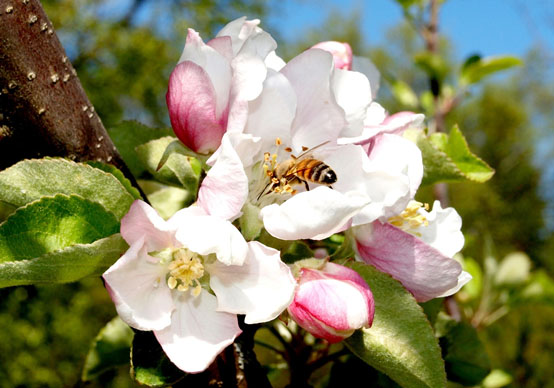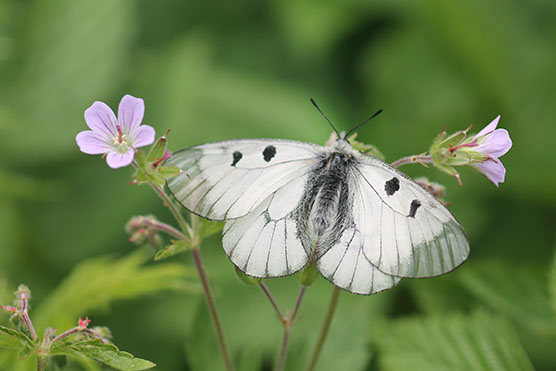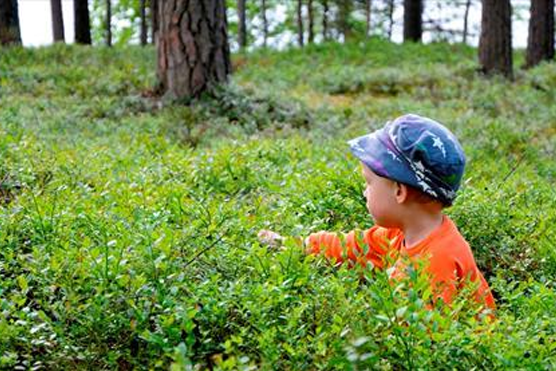Beekeepers ensure pollination services to farmers

© Photo Tarja Ollikka / SML.
Building on long-standing research and monitoring of pollinators, SYKE has recently developed an approach in which pollinator status and trends are analysed together with beekeepers, farmers and the public, using citizen-science. An ongoing project, PÖLYHYÖTY, analyzes also the economic value of pollination for agriculture in Finland.
Preliminary results of the ongoing work have been presented in national and international conferences as well as in newspapers and articles published in national professional journals. This work and the pollination theme have gained wide publicity also in the national radio and TV. The bumblebee monitoring relying on citizen science has been very popular. The 100 localities, in which the monitoring pilot have far exceeded the expectations.
Assessing the value of pollination
A questionnaire sent to members of the Finnish Beekeepers Association revealed that roughly half the beekeepers who answered the questionnaire had offered pollination services to farmers. The economic value of pollination for Finnish agriculture will be calculated during the winter of 2020-2021.
The results of the project feed to the National Pollinator Strategy and Action Plan. SYKE will propose launching a nation-wide pollinator monitoring scheme focusing on bumblebees in Finland.
Based on the project, SYKE has also actively made suggestions of pollinator-friendly measures to be included in the national agri-environment scheme under the current EU Common Agriculture Policy (CAP) reform.
For more on the impacts:
-
PÖLYHYÖTY -project (in Finnish)
- An article on previous pollinator work: Toivonen, M., Herzon, I., Rajanen, H., Toikkanen, J., & Kuussaari, M. (2019). Late flowering time enhances insect pollination of turnip rape. Journal of Applied Ecology, 56(5), 1164-1175.
Red lists are a tool for improving species and habitat protection

© Mikko Kuussaari.
SYKE coordinates the assessment of endangered species and habitats, the so called Red Lists. The latest assessments were carried out using the internationally comparable Red List Categories and Criteria of the IUCN, which Finland helped to develop. Each assessment has produced an extensive final report covering thousands of assessed species and hundreds of evaluated habitat types: the latest for species in 2000, 2010 and 2019 and for habitat types in 2008 and 2018.
Influencing Legislation
Red List assessments of species and habitats have played a major role in raising public awareness about the state of biodiversity in Finland. This has had a strong impact in national action plans and strategies and e.g. in the current government program.
The first Red List of Finnish habitat types served the changes made to the Environmental Protection Act and Forest Act, and the results of the latest assessment are being used in the ongoing reform of the Nature Conservation Act. The results of the species assessment are used in the concurrent update of the Nature Conservation Decree and in targeting funds to save threatened species.
Action with Action Plans
The results of the first habitats’ Red List and the expert network have been used to compile the first ever Action Plan for improving the state of threatened habitat types in Finland.
The second Red List of habitat types has contributed to the new Helmi Habitats Programme of the current Government, which aims to restore deteriorated habitats.
The action plan for species protection was completed in 2017. The conservation actions of species requiring urgent protection measures have been regionally agreed upon in 2012–2017. The prioritization of actions is to be continued based on the latest Red List of 2019.
Biodiversity is essential for ecosystem services
SYKE has been a driving force in developing the European biodiversity and ecosystem services agenda, contributing to the Mapping and Assessment of Ecosystem Services and leading governance research and development, and supporting Finnish cities in their green infrastructure and nature-based solutions work.
Recently, SYKE has supported the development of ecological compensations. Using Red List assessments, SYKE has developed a guideline for assessing the suitability of habitat types for biodiversity offsetting.
SYKE has actively participated in Finnish, European and international policy assessments and formulation, supporting the national Nature Panel and the Intergovernmental Science-Policy Platform for Biodiversity and ecosystem services (IPBES).
SYKE’s policy briefs on natural capital popularizes the importance of nature and ecological compensation.
For more on the impacts:
-
Suitability of habitat types for biodiversity offsetting in Finland
-
Ecological compensations are worth taking into use (Issuu) - Policy brief
-
Our natural capital is shrinking - the trend can be turned (Issuu) - Policy brief
- Pascual, U., Balvanera, P., Díaz, S., Pataki, G., Roth, E., Stenseke, M., Saarikoski, H. ... & Maris, V. (2017). Valuing nature’s contributions to people: the IPBES approach. Current Opinion in Environmental Sustainability, 26, 7-16.
How to implement ecological compensation?
In ecological compensation local damage caused by construction or industry is offset by improving biodiversity elsewhere. The principle is that the compensation is paid by the one that causes the damage. Diversity in nature is in a continuing global decline and new means are needed to stop the biodiversity loss. In Finland, there is interest for the development of ecological compensations, as the piloting of compensations has been included in the Government Programme of the spring of 2019.
The suitability of different habitat types for ecological compensation in Finland has been assessed in SYKE. “The design of ecological compensation must be based on knowledge of the extent of the threat facing the habitat and its rarity, and the skills required, and the methods involved in its restoration. Each compensation case needs careful and case-specific planning and consideration. Compensatory offsets can be best produced in habitats for which knowledge already exists for their restoration or management. For example, many threatened types of meadows are estimated to be well-suited for producing offsets, because their management can improve the viability of their flora and fauna and prevent them from becoming overgrown”, says Anne Raunio, Head of Unit at the SYKE Biodiversity Centre.
The SYKE Policy Brief published in 2019 states that legislation is needed to create rules for the compensation. The publication is aimed at decision-makers and companies.
For more
The Finnish Nature Day

© Eeva Mäkinen / Suomen luonnon päivä
The Finnish Nature Day is an annual holiday dedicated to the uniqueness of Finland’s nature. It is celebrated on the last Saturday of each August. The idea of having a flag day arose in the original background organizations of Finnish Nature Day: the Finnish Association for Nature Conservation, the Finnish Environment Institute SYKE, Parks&Wildlife Finland (part of Metsähallitus governing state-owned land and water), and the Association for Biology and Geography Teachers (BMOL).
The day was launched in 2013. In 2016 the Ministry of the Interior officially ordered that Finnish Nature Day will be an official flag day, making Finland the world's first country to honour its natural environment in this way. The Finnish Nature Day will appears in official calendars from 2020 onwards. The Nature Day aims to get people outdoors and to increase awareness of nature conservation. People can also participate in numerous events. This year there is competition of the best nature-themed poem. Mrs. Jenni Haukio, the first lady of Finland and ambassador of the event, will choose the winner. The winner is announced on 29.8.2020.
For more on the impacts:
Benefits of nature and outdoors to human health

© Mikko Kuusinen
Nature is important for human health and well-being. SYKE started looking into ecosystem services and human health in 2013, through an Argumenta project, which underlined the need and importance of ecosystem services to human health.
The SYKE project portfolio and active participation in national and international science-policy-society dialogue on the health benefits of nature has had an influence on how health benefits are approached nationally and internationally. In addition, SYKE has co-developed new practices with key stakeholders on how to approach health benefits on various scales.
SYKE has studied health through the approaches of nature-based solutions and green infrastructure in urban areas connected to sustainable diets and in collaborative ways in kindergartens. A national action model for Nature Step was developed based on the work in Kindergartens, carried out together with the Finnish Institute for Health and Welfare (THL), recommending a menu of mostly greens, and less food waste.
Save the planet, save yourself
SYKE has participated in the broadening of the European research agenda on the links between a healthy environment and climate change.
In 2019, SYKE was one of the organizers of Europe That Protects: Safeguarding Our Planet, Safeguarding Our Health, a key international event on planetary health. https://thl.fi/en/web/thlfi-en/whats-new/events/thl-s-eu-2019-side-events/europe-that-protects
The event culminated in the Declaration of Planetary Health, which stresses the interdependence between a healthy biosphere and human health.
For more on the impacts:
- A highly cited article on nature based solutions: Nesshöver, C., Assmuth, T., Irvine, K. N., Rusch, G. M., Waylen, K. A., Delbaere, B., ... & Krauze, K. (2017). The science, policy and practice of nature-based solutions: An interdisciplinary perspective. Science of the Total Environment, 579, 1215-1227.
-
Promoting health through interaction with nature in urban areas (Issuu) - SYKE Policy Brief